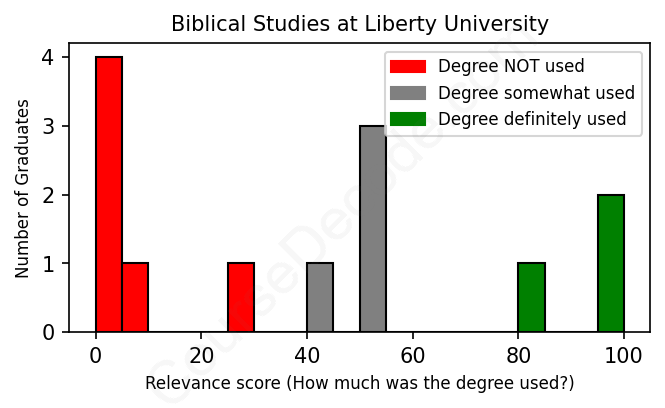
First, some facts. Of the Biblical Studies graduates from Liberty University we've analyzed , here's how many have used (or NOT used) their degree in their career:

These are estimates based on AI analysis of 13 LinkedIn profiles (see below).
The verdict? Bad. Overall, with an average relevance score of 39%, Biblical Studies graduates from Liberty University have a substantially lower likelihood (-28%) of finding work in this field compared to the average graduate across all fields:
And for comparison, here's the chart for all profiles we've looked at across all degrees.
Also, after graduating, 53% of these graduates have pursued further education other than another Bachelor's degree (such as a Masters degree or other), compared to the average across all profiles of 35%. This suggests you may need more than just a Bachelors degree to be competitive as a Biblical Studies graduate.
See the details:
|
Relevance score: 41% We think this person has gone into a career only somewhat relevant to their degree. We think this person has gone into a career only somewhat relevant to their degree.
DEGREE INFOGraduated in 2011 from Liberty University with a Bachelor of Science (BS) in Biblical Studies. No other secondary education since. JOB HISTORY SINCE GRADUATIONWarehouse Manager Saddleback Resources Apr 2012 - Feb 2014 Project Manager  Saddleback Resources Feb 2014 - Jul 2015 House Manager  Victory House - Men's Recovery Home Jul 2015 - Jul 2017 Airbnb Rental Manager  Self Employed Nov 2017 - Aug 2023 Fedex Courier  FedEx Feb 2021 - Jun 2024 Clinical Mental Health Counselor  PsyCare, Inc. Feb 2024 - Present ABOUTNo information provided. |
The top 10 most common jobs done by the graduates we've analyzed (ranked most common to least) are:
From the analysis of LinkedIn profiles of graduates with a degree in Biblical Studies from Liberty University, it's clear that many of these individuals have found themselves in a wide range of jobs, with only a handful directly related to their studies. Common positions include roles like warehouse manager, project manager, and various managerial positions in different sectors such as health care, hospitality, and retail. These jobs often focus on operational management, customer service, and general administration—fields that typically don't tap into the theological underpinnings of their degree.
However, there are notable exceptions where graduates are engaged in positions that directly utilize their Biblical Studies knowledge, such as Senior Pastors or roles in mental health counseling. These jobs highlight the more relevant applications of their education, allowing them to bring theological insights into practice. Overall, while many graduates have ventured into careers that don’t harness their Biblical Studies expertise, those who pursue roles directly linked to ministry, counseling, or missions clearly find their degree quite pertinent. So, if you're thinking about this degree, be prepared for a mix of possibilities—some that might connect with your passion for faith and others that might lead you elsewhere entirely!
Here is a visual representation of the most common words in job titles for Biblical Studies graduates (this is across all Biblical Studies graduates we've analyzed, not just those who went to Liberty University):

When looking at the career paths of Liberty University graduates who majored in Biblical Studies, it becomes clear that their trajectories are quite varied. For many, the first jobs after graduation often reflect an immediate connection to their studies, with roles like Senior Pastor or positions in church-related organizations being popular. However, not everyone seems to dive straight into religious vocations—some have taken on more secular roles in areas such as project management, human resources, or even customer service. It seems that while some graduates find a clear path in ministry or nonprofit work, others may veer off into roles that don't directly relate to their studies.
As time progresses, about five to ten years after graduating, the picture becomes even more mixed. There are notable successes like those who remain in pastoral roles or take on leadership within church organizations. Still, there are also examples of graduates who shift towards completely different career fields, such as management, teaching, or even creative roles like writing and photography. Overall, while some graduates certainly secure fulfilling positions that align with their Biblical Studies degree, many others end up exploring a broader range of career options, leading to a blend of outcomes that reflect both success and divergence from their original focus. This indicates that a degree in Biblical Studies can lead to diverse careers, both relevant and seemingly unrelated to theology.
Getting a Bachelor’s degree in Biblical Studies, like the one at Liberty University, can be a mixed bag in terms of difficulty. For some students, especially those with a solid background in theology or a love for scripture, it might feel pretty manageable and even enjoyable, since a lot of the coursework deals with exploring texts, history, and interpretation. On the flip side, if you’re not familiar with biblical texts or theology, you might find the reading loads challenging and some of the concepts pretty dense. Overall, it’s probably around the average difficulty for a college degree—there are definitely tough spots, but it’s also designed to be accessible for students who are passionate about the subject. It really depends on your interests and your willingness to dive into the material!
Most commonly, in the LinkedIn profiles we've looked at, it takes people 4 years to finish a Bachelor degree in Biblical Studies.
Looking at the jobs of these Liberty University grads, it seems like they’ve got a decent mix in terms of earnings, but it really varies. Some, like the senior pastors and the project managers, likely make pretty good money, especially if they're in more established positions or have been around for a while. Others, particularly those in more entry-level or service-oriented roles (like a warehouse manager or a phlebotomist) probably aren’t raking in the big bucks just yet. A few are starting their own businesses, which could go either way in terms of income. Overall, it seems like some are on a solid path to decent salaries, while others are still figuring things out. So, while it’s a mixed bag, there definitely are opportunities for good pay down the line!
Here is a visual representation of the most common words seen in the "about" section of LinkedIn profiles who have a Bachelor degree in Biblical Studies (this is across all Biblical Studies graduates we've analyzed, not just those who went to Liberty University). This may or may not be useful:

Here are all colleges offering a Bachelor degree in Biblical Studies (ordered by the average relevance score of their Biblical Studies graduates, best to worst) where we have analyzed at least 10 of their graduates:
| College | Score | Count |
|---|---|---|
 Liberty University Liberty University
|
39 | 13 |